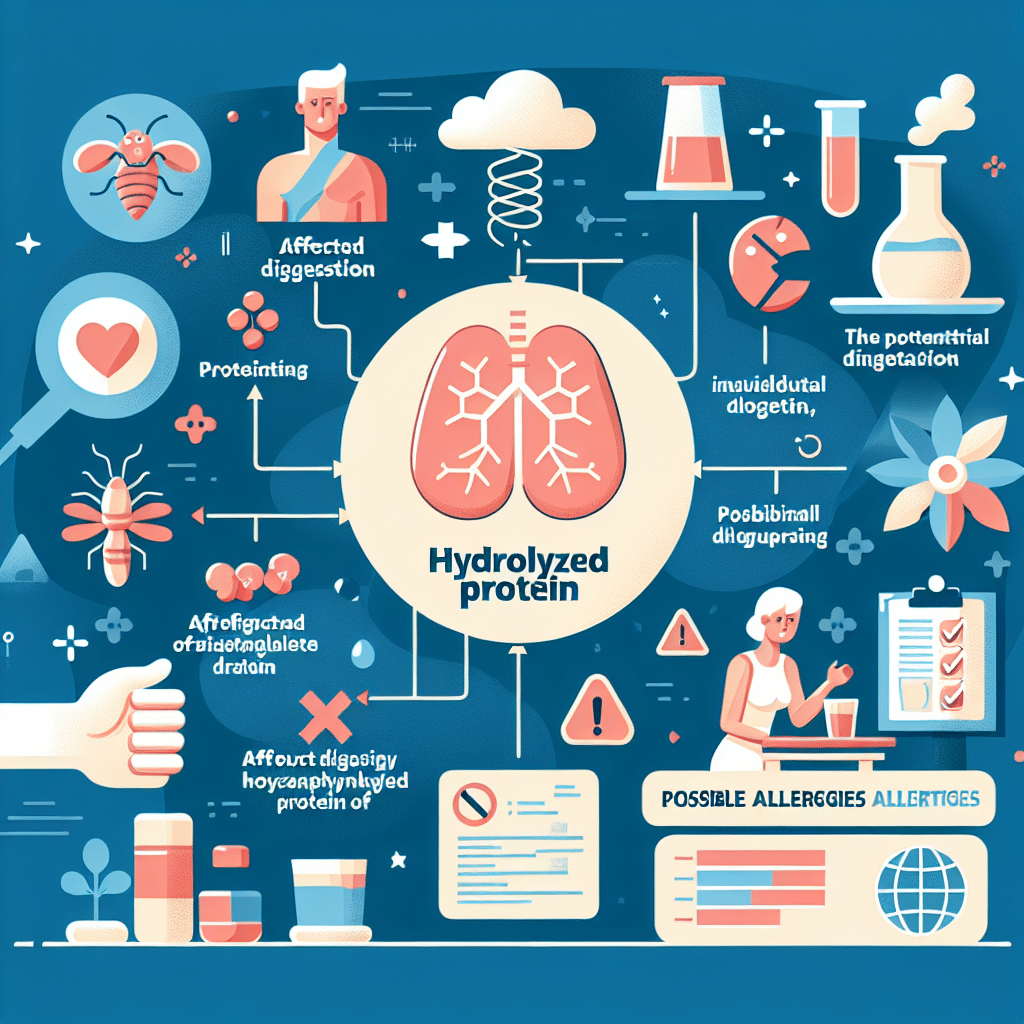What Are The Cons Of Hydrolyzed Protein? The Answer
Table of Contents
- Hydrolyzed Protein: Understanding the Potential Downsides
- 1. Potential Allergic Reactions
- 2. Taste and Palatability Issues
- 3. Cost Considerations
- 4. Limited Research on Long-Term Effects
- 5. Processing and Additives
- 6. Nutritional Imbalance
- 7. Digestive Discomfort
- 8. Interactions with Medications
- Conclusion: Weighing the Pros and Cons
- Discover ETprotein’s High-Quality Protein Products
Hydrolyzed Protein: Understanding the Potential Downsides

Hydrolyzed proteins are proteins that have been broken down into smaller peptides or amino acids through a process called hydrolysis. This process makes the proteins easier to digest and often faster to absorb, which is why hydrolyzed protein is a popular ingredient in many dietary supplements, sports nutrition products, and medical foods. However, despite their benefits, hydrolyzed proteins are not without their drawbacks. In this article, we will explore the cons of hydrolyzed protein, providing valuable insights and relevant examples to help you make an informed decision about your protein intake.
1. Potential Allergic Reactions
One of the primary concerns with hydrolyzed protein is the potential for allergic reactions. Although hydrolysis is intended to reduce the allergenicity of proteins by breaking them down into smaller components, some individuals may still experience allergic responses. For example, individuals with a sensitivity to dairy may still react to hydrolyzed whey protein, as some allergenic peptides can remain intact even after hydrolysis.
2. Taste and Palatability Issues
Another downside to hydrolyzed protein is the taste. The hydrolysis process can produce a bitter flavor, which may be off-putting to some consumers. Manufacturers often have to add flavorings or sweeteners to mask the bitterness, which can lead to an increase in the product’s sugar content or the inclusion of artificial additives.
3. Cost Considerations
Hydrolyzed proteins are typically more expensive than their non-hydrolyzed counterparts due to the additional processing required. This cost can be a significant factor for consumers who are on a budget or for those who consume protein supplements regularly.
4. Limited Research on Long-Term Effects
While hydrolyzed proteins are generally considered safe, there is limited research on the long-term effects of consuming hydrolyzed protein supplements. Some health professionals express concerns about the high concentrations of free amino acids and peptides and their potential impact on health over time.
5. Processing and Additives
The hydrolysis process often involves the use of acids or enzymes, which some consumers may prefer to avoid. Additionally, hydrolyzed protein products may contain various additives to improve their stability, taste, or shelf life, which can be a concern for those seeking natural or minimally processed foods.
6. Nutritional Imbalance
Consuming hydrolyzed protein in excess, particularly in supplement form, can lead to an imbalance in nutrient intake. Over-reliance on protein supplements can result in inadequate consumption of other essential nutrients found in whole foods, such as fiber, vitamins, and minerals.
7. Digestive Discomfort
Some individuals may experience digestive discomfort, such as bloating or gas, when consuming hydrolyzed protein supplements. This can be due to the high concentration of peptides and amino acids, which can draw water into the intestine and speed up transit time.
8. Interactions with Medications
Hydrolyzed protein supplements can interact with certain medications, potentially affecting their absorption and efficacy. It is important for individuals on medication to consult with a healthcare provider before adding hydrolyzed protein to their diet.
Conclusion: Weighing the Pros and Cons
In conclusion, while hydrolyzed protein offers benefits such as improved digestibility and faster absorption, it is important to consider the potential downsides. Allergic reactions, taste issues, higher costs, limited long-term research, processing concerns, nutritional imbalance, digestive discomfort, and medication interactions are all factors to keep in mind. As with any dietary supplement, it is essential to evaluate your individual needs and consult with a healthcare professional before making changes to your protein intake.
Discover ETprotein’s High-Quality Protein Products
If you’re looking for high-quality protein products, ETprotein offers a range of organic bulk vegan proteins that cater to various dietary preferences and needs. Their products are characterized by a neutral taste, non-GMO, and allergen-free attributes, ensuring that you can enjoy the benefits of protein without the common drawbacks associated with hydrolyzed proteins.
About ETprotein:
ETprotein, a reputable protein and L-(+)-Ergothioneine (EGT) Chinese factory manufacturer and supplier, is renowned for producing, stocking, exporting, and delivering the highest quality organic bulk vegan proteins and L-(+)-Ergothioneine. They include Organic rice protein, clear rice protein, pea protein, clear pea protein, watermelon seed protein, pumpkin seed protein, sunflower seed protein, mung bean protein, peanut protein, and L-(+)-Ergothioneine EGT Pharmaceutical grade, L-(+)-Ergothioneine EGT food grade, L-(+)-Ergothioneine EGT cosmetic grade, L-(+)-Ergothioneine EGT reference grade and L-(+)-Ergothioneine EGT standard. Their offerings, characterized by a neutral taste, non-GMO, allergen-free attributes, with L-(+)-Ergothioneine purity over 98%, 99%, cater to a diverse range of industries. They serve nutraceutical, pharmaceutical, cosmeceutical, veterinary, as well as food and beverage finished product distributors, traders, and manufacturers across Europe, USA, Canada, Australia, Thailand, Japan, Korea, Brazil, and Chile, among others.
ETprotein specialization includes exporting and delivering tailor-made protein powder and finished nutritional supplements. Their extensive product range covers sectors like Food and Beverage, Sports Nutrition, Weight Management, Dietary Supplements, Health and Wellness Products, and Infant Formula, ensuring comprehensive solutions to meet all your protein needs.
As a trusted company by leading global food and beverage brands and Fortune 500 companies, ETprotein reinforces China’s reputation in the global arena. For more information or to sample their products, please contact them and email sales(at)ETprotein.com today.














